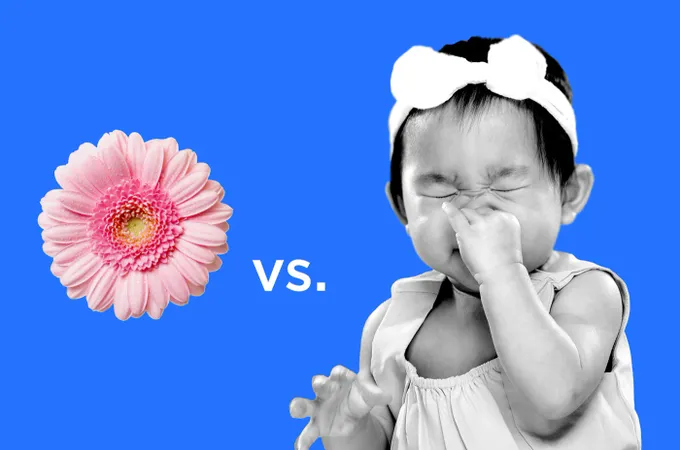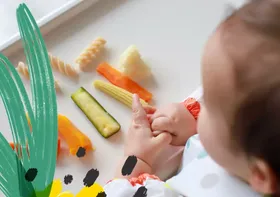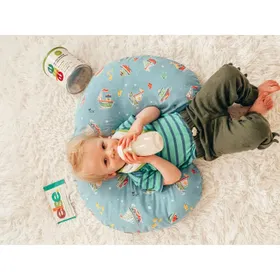Toddler Seasonal Allergies: Symptoms & Treatment
Understand and manage your toddler's seasonal allergies. We cover everything from allergy symptoms to treatment and prevention tips.
Published August 14, 2024

Your toddler is sneezing more than that viral baby panda. Is it a cold or something else entirely?
Seasonal allergies in little ones can mimic a common cold, making it challenging for you to decipher what's really bugging them. That's why we've prepared the telltale signs and tips to protect your little one from allergens.
» Try a formula that's safe for toddlers with cow's milk protein allergies
How Do Toddlers Get Seasonal Allergies?
Toddlers can get seasonal allergies just like grown-ups. Some kids start having them as early as one or two years old, but most get them between ages three and five.
Lots of things can cause seasonal allergies, such as dust, pet hair, and mold inside your home. But pollen from outside is usually the biggest problem, especially in spring, summer, and fall. Kids allergic to a certain type will probably have symptoms around the same time each year.
Pollen is the number one public enemy for allergy-prone toddlers. Trees like cedar, birch, oak, maple, and pine release pollen in the spring, while grass pollen follows closely behind.
Summer and fall bring weed pollen, especially from ragweed. Hot, dry, windy days are the worst for allergies since pollen loves to travel. Each kid is different, so they might be allergic to one or more types of pollen or mold and have symptoms at different times of the year.
» Explore the symptoms of milk allergies in babies
Symptoms of Seasonal Allergies in Toddlers
Here are more telltale symptoms of toddler seasonal allergies:
- Dark under-eye circles
- Watery, itchy, red, or puffy eyes
- Frequent mouth breathing
- Sneezing
- A dry cough
- Wheezing
- Irritability, restlessness, or fatigue
- Nasal congestion
- An itchy, runny (with clear mucus) or stuffy nose
- Itchy skin, throat, or inner ear
- Trouble sleeping
- Shortness of breath
- Headache
Seasonal allergies are often called "hay fever" or allergic rhinitis, but don't let the name fool you—there's no fever involved.
Sometimes, your kid might just have a cold. But telling the difference can be hard if you're not a doctor. Remember that colds come with a fever and green mucus and develop slower. Allergy symptoms start right after your toddler exposes themselves to something triggering.
» Learn what to do if your sick toddler won't eat or drink
How to Treat Seasonal Allergies
If you have begun noticing symptoms in your toddler that may denote seasonal allergies, you can follow a few simple steps to start treating the symptoms.
Consult An Allergist
Kids often have a tougher time dealing with allergies than adults, so it's crucial to get help. Left untreated, they can lead to bigger problems like asthma, sinus infections, earaches, and other health issues.
An allergist can find what triggers your toddler's allergies with a simple test. They prick the skin with a tiny bit of the allergen. If your child is allergic, it'll get red and swollen. They might also inject it under the skin, where a raised bump points to an allergy.
» Explore milk and dairy alternatives for allergic toddlers
Limit Exposure
You can take steps to help your child feel better. The best way to manage allergies is to limit exposure to triggers.
If your child has severe allergies, keep windows closed and play with them inside as much as possible. When you have to go out, have non-drowsy antihistamines, eye drops, and saline nose spray ready. Also, change your child's clothes right away when you come inside to get rid of pollen.
It's also a good idea to avoid other things that can irritate their allergies, like smoke, spray, strong smells, wind, pollution, and fumes.
» Discover foods kid's allergic to soy should avoid
Change Your Child’s Diet
While staying indoors is helpful, it's not the only solution. Certain foods can actually worsen allergy symptoms. For example, bananas might intensify ragweed allergies, and dairy and gluten can increase mucus production, leading to more runny noses and congestion.
If your child relies on milk for essential nutrients, don't worry. Plant-based alternatives like Else Complete Nutrition for Toddlers can provide the same benefits without the allergens. This drink is packed with minerals. It even has vitamin C, which can ease allergy symptoms.
» Explore lactose intolerance signs in kids
Tips To Prevent Seasonal Allergies
Here's how to prevent your toddler from catching seasonal allergies in the first place:
- Keep The House Clean: Regular cleaning is vital to keeping dust and pollen out. Vacuum and wash bedding often, especially during allergy season. Running the air conditioner and using an air purifier can also clear the air.
- Keep The Outdoors Out: After being outdoors, remove shoes, wash clothes, and bathe your kids to get rid of pollen. If your pets have been outside, bathe them and keep them away from your kids for a bit.
- Be Informed: Keep an eye on the seasons that trigger your child's allergies and be prepared. Some weather apps can tell you the pollen count and wind speed so you can plan indoor activities on such days.
» Find out why you should switch to a soy-free baby formula
Help Your Toddler Breathe Easy This Season
Seasonal allergies can be really annoying for toddlers, making them and you feel miserable. While these allergies usually go away, it's essential to know what to look for and how to help your child feel better.
By watching for allergy symptoms, taking steps to prevent them, and talking to your child's doctor, you can make allergy season easier for both of you. Over-the-counter medicines might help, but it's always a good idea to check with your doctor first to get the best advice for your child.
With a bit of extra care, most toddlers can get through allergy season feeling happy and healthy.
» Ease your toddler food allergy concerns. Try an organic baby cereal
Resources:
FAQs
Do humidifiers help with allergies?
Yes and no. They can soothe dry sinuses but also create a breeding ground for allergens like dust mites. Aim for 40-50% humidity, and clean your humidifier regularly.
How long do allergies last in toddlers?
Allergy symptoms typically last as long as the child is exposed to the allergen. Seasonal allergies can linger for weeks, while food allergies may be lifelong.
What does a very mild allergic reaction look like?
Mild allergies often cause sneezing, runny nose, itchy eyes, and mild skin redness. Symptoms are usually bothersome but not severe.
Can a 2 year old have seasonal allergies?
It's less common, but possible. Children usually develop seasonal allergies around ages 2-5. If your child has persistent symptoms, consult a pediatrician.
What is the best natural antihistamine?
There's no single "best." Popular options include quercetin, vitamin C, stinging nettle, and butterbur. Effectiveness varies by person. Always consult a doctor before trying new supplements.
Disclaimer: The content and advice provided in this article is for informational purposes only and is not a substitute for medical diagnosis, treatment, advice for specific medical conditions. Always consult a pediatrician to understand your kid's needs.










